
MCFB’s Livestock Producer Assistance Program Helps Ranchers
| MCFB received $15,000 and committed the funds to extend our Farm Product Purchase Program (FPPP), an initiative to purchase produce and proteins from local farms and ranches and distribute to communities in need. At the time of the donation, MCFB’s program had purchased and distributed 678,954 pounds of food and was working with 22 Maui farms. |
“We are so grateful for First Hawaiian Bank Foundation’s generous donation to the Maui County Farm Bureau,” said Teena Rasmussen, MCFB board president. “This is truly one of the most difficult times to be farming. This gesture has been a morale boost to our farmers who have continued to plant and feed our community. Donations like this keep our farmers in business. Our heartfelt thanks to First Hawaiian.”
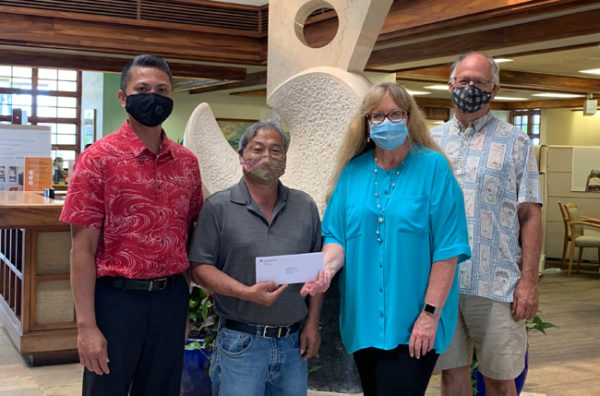
According to First Hawaiian Bank the “Aloha for Hawaii” fund also contributed to 14 other nonprofits providing assistance to people affected by COVID-19 as part of the initiative. Some of them include Aloha Harvest, The Henry Kapono Foundation, the Hawaii and Maui Food Banks and Empty Vessel Ministry Foundation located in Saipan.
MCFB’s Livestock Producer Assistance Program Helps Ranchers
In mid-July, the Maui County Farm Bureau introduced the Livestock Producer Assistance Program (LPAP) as a means to help ranchers whose livestock operations have been directly impacted by the coronavirus pandemic. After careful review of the applications, over $12,000 in funds were awarded to 19 livestock producers on Maui and Moloka‘i whose family’s represent agricultural production on 9,345 acres of land, totaling over 1500 cows, 980 hogs, 670 goats, 150 sheep, 70 horses and 330 laying hens.
“The COVID-19 crisis reminded us all of the importance of ensuring our island’s food security,” said Dr. Kyle Caires, LPAP chair and MCFB vice president. “We all know that empty shelves in the grocery store can be frightening, but I assure you that vacant fields and empty pastures would be far more devastating to our island culture and economy as we move into the future. Our awardees represent roughly 693 years of ranching experience in Maui County, and we’re glad that the LPAP was able to help these ranchers weather the storm and stay in business.”
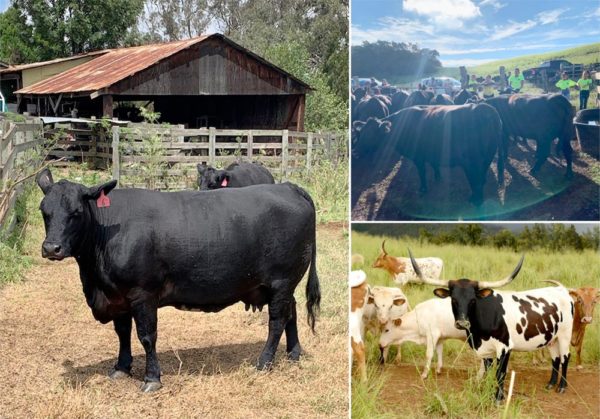
A list of awardees:
• Jeff & Donna Alexander, Anuhea Hog Farm, Maui
• Larry Alexander, LA Ranch, Maui
• Stephen & Cora Cabral, Cabral’s Ranch, Maui
• Avery Chumbley, Makani ‘Olu Ranch, Maui
• Vincente Hanalei Colleado, Ho’omana Farms, Maui
• Keith & Kaui Dickson, Circle DL Ranch, Maui
• Christy Gusman, Hawaii Youth Livestock Association, Maui
• William G. Jacintho, Beef and Blooms, Maui
• Dennis Kamakana, Kamakana Farm, Moloka‘i
• Faataatia Lauifi, Lauifi’s Farming, Moloka‘i
• Paul & Colleen Lopes, Lopes Farm, Maui
• Emerson Makekau, Makekau Ranch, Moloka‘i
• Annette Niles, Perreira Ranch, Maui
• James Nobriga, Nobriga’s Ranch, Maui
• Terri Rezentes, JR Ranch LLC, Maui
• Michael Santos, J2 Santos Ranch, Maui
• Rory Souza, Souza’s Ranch, Maui
• Gerard Thompson, Thompson Ranch, Maui
• Paige DePonte, Triple L Ranch, Maui

Save the Date for MCFB’s Annual Meeting
Wednesday, September 30 at 6:30 p.m.
Virtual Via ZOOM
Election ballots will be mailed in advance. We will be voting on By-laws revisions and new board members. ZOOM link will be sent out prior to the meeting.


Kula Teachers Move to Advance Kula School Agricultural Science Program
Support of agriculture is commonly heard on the street. It is not often that this talk is moved to action. This is what happened in Keokea in 2018.
| A group of residents wanted to preserve the agricultural heritage of Upcountry Maui while ensuring that the agricultural pipeline for future farmers and ranchers was full. |
| The group turned an overgrown parcel that was the original site of Keokea School into a working farm, now known as the Kula School Agricultural Science Program. The DLNR parcel has since been transferred to the Department of Education. It is a critical step to creating an interest in agriculture as a career choice for students and ensuring that we have a trained local workforce to continue Upcountry Maui’s agricultural legacy. |

| The Kula School Agricultural Science Program, also known as Keokea-Ag Farm, became the focus of a team of Kula Elementary teachers during the summer. Led by Carolyn Walker, the team completed a grant application to Farmers Insurance. The goal of the grant is to develop a Virtual Agricultural Resource Library for use by teachers on Maui and across the state. It is expected to provide an option to use agriculture as a reason why students need to learn reading, writing, math, science and other basic academic skills. After all, how will you know how much seeds to buy without math? Or, how will you know you got the right change at the store? The vision seeks to use real life examples to demonstrate the relevancy of education. The curricula will also be used to maximize learning as they go to the Farm located at the old Keokea School site. The Farm is currently undergoing a facelift under the leadership of former Kula Elementary School principal Chris Baucus along with a team of volunteers. The orchard has begun bearing its first fruit, and crops started from seeds donated by Kula Country Farms and Bayer have been planted in time for Thanksgiving. This venture provides hope for growing future farmers and ranchers. |
| We are excited to see this project grow. |

Executive Director

MCFB Serving on Mayor’s Economic Recovery Task Force – Food & Farm Sector

MCFB President Teena Rasmussen and MCFB Executive Director Warren Watanabe were asked to serve on the Mayor’s Economic Recovery Task Force in the Farm and Food Sector. The immediate purpose of the task force is to find ways to help different sectors in our economy by deploying CARES ACT funding received by the County of Maui. The group had two meetings and came up with several broad programs to help as many farmers, ranchers and food distribution services as possible.
The most notable program for the ag community was the request for a $5-million grant fund for farmers and ranchers. In addition, MCFB asked for funds to make critical repairs to the Kula Vacuum Cooling Plant refrigeration units and made a joint request with Hawai’i Farmers Union United (HFUU) to continue their Farm Product Purchase Program through the end of December.
The final package of recommendations is with Mayor Victorino now for decision making. Once decided, the announcement will be forthcoming from the Mayor’s Office.

Maui Grows Coffee
Our climate and topography here on Maui create some of the best growing conditions in the world—and you can taste it in our coffee.
Maui coffees consistently rank as some of the state’s best coffee in the Hawaii Coffee Association’s annual Statewide Coffee Cupping Competition.
The Maui coffee industry continues to expand, with close to 600 acres (243 hectares) in total coffee production, 500 acres (202 hectares) in large commercial production and about 100 acres (40 hectares) in smaller independently owned farms that hand-pick and hand-process their coffee.
The industry is represented by the Maui Coffee Association (MCA) which has been an active voice for growers and roasters since 2005. It now has over 50 members and meets once a month in Kula. MCA is a commodity group under the Maui County Farm Bureau.
Historically, articles in a 1904 issue of The Maui News report many healthy coffee plantations on Maui in the Kokomo Districts as well as plantings in West Maui. Editorials from the early 1900s call for legislative protections of the valuable crop. The Bourbon variety of coffee currently found in the Kokomo District of Maui are thought to be descendants of the trees from Judge Charles Copp’s plantation.

| The owner of Maliko Estate Coffee located in the Kokomo District has spoken to several people who remember, as children, picking the wild coffee in Maliko Gulch during World War II. Their parents would process and roast the beans and then they were able to trade the coffee with the Marines stationed at the 4th Marine Base on Kokomo Road. Their favorite thing to trade for was a can of Spam. One pound of coffee = 1 can of Spam. The Franco family began roasting and blending Maui Organic coffee in 1918. Their farm is in the Keokea region of Upcountry Maui. In fact, their hand-made, wood-fired coffee roaster can still be seen in Grandma’s Coffee House, located on the Lower Kula Highway in Grandma Franco’s historic home. On the Lahaina side, MauiGrown Coffee is the largest individually operated coffee grower in the U.S. and the original and only major producer of 100% Maui origin coffee in the world. So, what does Maui coffee taste like? It’s hard to pinpoint because of the diversity of the crop. Maui coffee farmers grow many different varietals including: Typica, Catuai, Caturra, Bourbon and Mokka in a range of micro-climates on the slopes of Haleakala and the West Maui Mountains. Many farmers also experiment with different processing techniques that add unique flavor aspects. Let’s just say that Maui coffee tastes every bit as delicious as you’d expect from coffee grown on our beautiful island. |

Meet James Kimo Falconer, Director
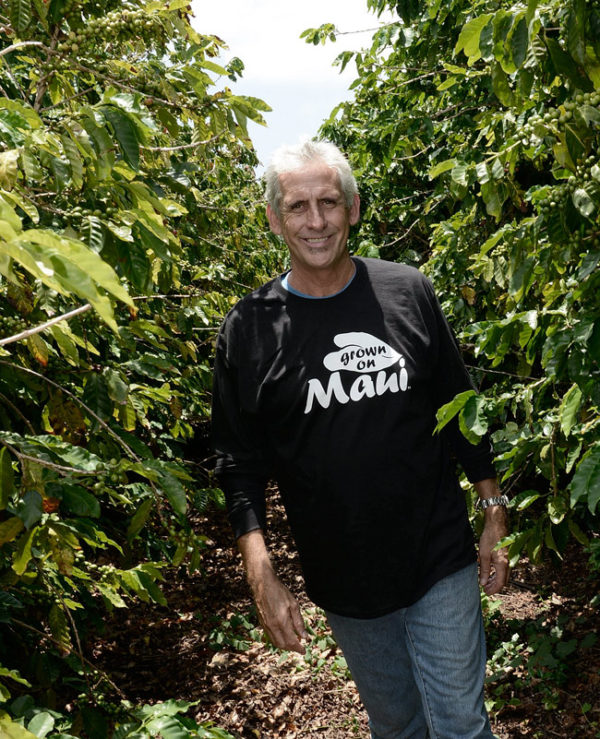
James “Kimo” Falconer was raised in California on his paternal grandfather’s family farm, but he is a Maui boy at heart. “When school ended every year, my parents put me on an airplane and I was off to Maui to live with my maternal grandparents for the summer,” Kimo says. “My mom’s Freeland family goes back many generations in Lahaina.”
| Kimo recalls the good old days—surfing, fishing, and hanging out with all of the “braddahs” from the west side—as some of the best times of his life. Although times have changed and Lahaina has grown in population, those childhood memories created some of his best friends. |
| Kimo’s life came full circle after graduating from Cal Poly State University, San Luis Obispo with a bachelor’s degree in crop science with a focus in agronomy and plant protection. He was hired by Amfac in 1979 as a diversified crops supervisor at Lihue Plantation on Kaua‘i. Within three years, by 1982, he was moved to Pioneer Mill Sugar Company as assistant agronomist and became department head of ag research in 1987. During these years, Kimo came to live with his grandparents again. He recalls these times as special opportunities to spend quality time with his grandparents. Aside from managing the crop control duties of sugar production, his department also oversaw any work relative to the development of new crops. His team planted the first coffee test plots at Pioneer Mill, which eventually grew to 500 acres of specialty coffee under the limited business name of Kāʻanapali Estate Coffee, a subsidiary of Pioneer Mill Co. In 1999, Pioneer Mill Co. closed its sugar operation and likewise its coffee operations in 2001. In 2003, Kimo launched MauiGrown Coffee, Inc. (MGC) through a lease of the former abandoned Kāʻanapali Estate Coffee farm with his former employers and land owners, JMB Realty, who had bought Amfac in 1988. He wrote grants, took out loans and his wife went back to work so he could resurrect the weed-infested and otherwise forgotten coffee farm. Dirty details aside, he was successful enough to fully bring back 400 of the originally planted coffee farm to full production. It yields over a half million pounds of green MAUI origin coffee annually, and today MGC is the state’s largest individually operated coffee farm. MGC ships coffee to every coffee roaster in Hawai‘i as well as to every state in the U.S. It also exports to Japan, Korea, Taiwan, Australia and many European countries. In 2006, Kimo opened MauiGrown Coffee Company Store to serve the roasted retail coffee needs of the Maui community. Today Kimo, his wife and two sons reside there in Lahaina where Kimo grew up and worked most of his life. Devoted to agriculture, Kimo is involved in: • Maui County Farm Bureau (Director) • West Maui Soil and Water Conservation District (Director since 1990) • West Maui Watershed Partnership (1997) • Hawaii Coffee Growers Association (State Board, President) • National Genetic Resources Advisory Council (National Advisory Committee) • Cal Poly Advisory Council on Tropical Ag (University Committee) • Hawaii Coffee Association (State Board) • Pacific Coast Coffee Association (National Board) • Tri-Isle Resource and Conservation District (Board) • Friends of Moku‘ula (President) |

Meet Jimmy Jones, Pukalani Plant Co., Member
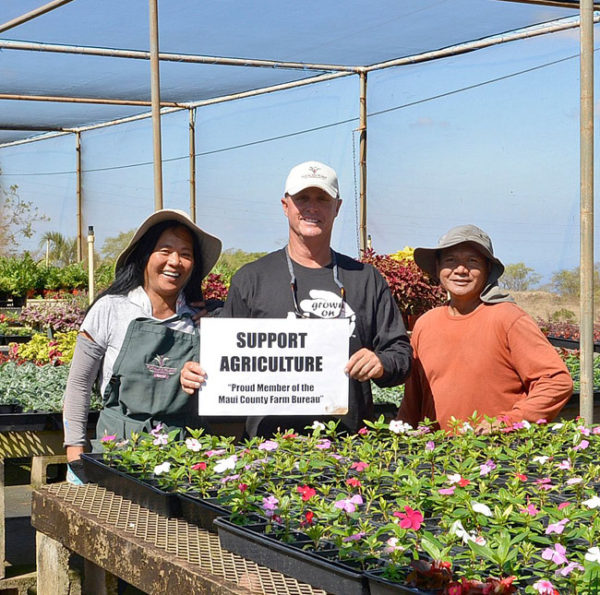
Think back to the last time you were shopping in the garden department at Lowe’s or Walmart and you bought a basil, rosemary, lettuce, or kale starter—or a fully established Tahitian Gardenia plant. Chances are they all came from Pukalani Plant Company, grown and nurtured by Jimmy Jones and his team at the plant farm and nursery located on the southern slopes of Haleakala.
Nearly 30 years ago, Pukalani resident Jimmy set his mind to becoming self-employed and taking on the challenge of being in control of his failures and successes. Today, Jimmy’s plant nursery has nine full-time employees and is known within nursery retail and wholesale circles for consistently offering a large selection of quality plants.
Pukalani Plant Co. specializes in growing plants to supply retail outlets, including garden shops and large retail stores, as well as working closely with landscapers and the hotel and condominium industry on Maui. The Upcountry nursery grows everything from vegetable and herb seedlings to field stock plants and trees.
Pukalani Plant Co. started in 1992 in the backyard of a home in Pukalani. In 2005, the company acquired an existing operation and moved the business to a much larger site. In this same year, Pukalani Plant Co. became a member of the Maui County Farm Bureau. “MCFB makes us aware of things going on at the county and state level that could benefit us or adversely affect us,” Jimmy said. “They’re the voice that supports our industry.”
During these challenging times of COVID-19, Pukalani Plant Co. continues to work hard and stay positive. According to Jimmy, “A segment of our market has adjusted because the hotel industry has been disrupted so badly. We have some orders pending with a few hotels, but they are on hold due to the travel restrictions.”
Here’s to continued success for Pukalani Plant Co.. Remember to check out the variety of plants and flowers the next time you’re shopping at Lowe’s Home Improvement, Walmart, and Home Depot in Kahului, Kihei Ace, and Kula Hardware and Nursery. Contact: (808) 572-1134 or www.pukalaniplantco.com

Ag in the Classroom
MCFB is revamping its annual Agriculture in the Classroom program for second graders this year. New this year is a virtual lesson plan for the in-class portion of our program entitled: “Where Would We Be without Seeds?” If this is widely accepted, MCFB will also create a virtual field trip featuring our ag partners including Haleakala Ranch, field trip venue host.
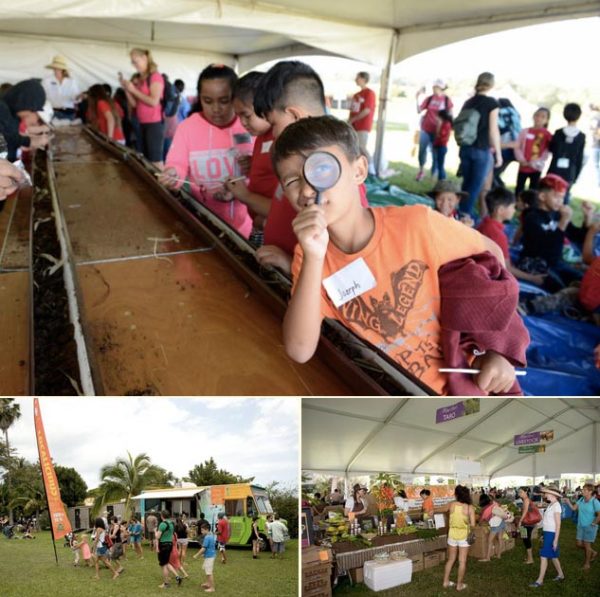
Maui AgFest & 4-H Livestock Fair into the Future
MCFB is working with Council Member Riki Hokama and committee on a five-year license agreement for its Maui AgFest & 4-H Livestock Fair, years 2021-2025, at the War Memorial Complex and Special Events Field. Having a multi-year permit will provide many opportunities for MCFB members and participants, mainly efficiency in event planning, marketing and sponsorships.
Market Opportunities for MCFB Members
MCFB continues to pursue market opportunities for our members. As explained in the first story, MCFB’s Farm Product Purchase Program (FPPP)—our COVID-19 relief program launched at the start of the pandemic—continues with the goal of running through December. We will keep you posted. Meanwhile, please continue to contact Heidi Watanabe, FPPP produce coordinator, at (808) 357-8593 if you have produce or proteins available.
Highlighting MCFB Members
MCFB would also like to shine the spotlight on our members. Please email charlene [ at ] kauhaneinc.com if you have anything new or exciting to share about your farm or business. Also, a reminder about MCFB’s Membership Drive:
Refer a Friend, Win a Gift Card
We ask all active members to reach out to your fellow farmers, ranchers and friends of agriculture and ask them to join MCFB. Those who bring in the most new members will receive cash gift cards with values of $250, $150 and $100. The membership drive ends October 1st. That gives us just August and September to reach our goal of 20 new members.

Go to mauicountyfarmbureau.org to download the our new membership drive brochure and application (go to Members in the menu bar; click on Brochure and Form). Be sure to have your contacts put you down as a referral.
You can always contact Lynne Woods at crash622@gmail.com with the names of those you know would benefit from being part of the Maui County Farm Bureau family. Lynne will gladly reach out to them on your behalf.

Local Sweet Corn Fritters with Lime Cumin Aioli
Recipe by Kris Kersmarki, Executive Sous Chef, Hula Grill Kā‘anapali

Local corn shines in this recipe created by Chef Kris Kersmarki for the 2019 Grand Taste hosted by the Maui County Farm Bureau at Maui AgFest & 4-H Livestock Fair. Judges said Chef KK did a fantastic job showcasing local ingredients in a fun and easy recipe that’s perfect for island-style potluck gatherings. These crispy sweet corn fritters can be served either as a pupu or a side dish.
Chef KK is Sous Chef at Hula Grill Kā‘anapali, a landmark oceanfront restaurant known for its “chef-driven dining” featuring local, line-caught fresh fish, Maui grown produce, and all-natural meats. An Orlando native, Chef KK grew up helping his parents prepare family recipes and fresh-caught seafood. Ongoing exposure to Southern, Creole and Caribbean cuisines inspired his culinary creativity and eventually led him to a Sous Chef position with Bubba Gump Shrimp Company. He led Bubba Gump’s Lahaina team for six years as Executive Chef before moving to Hula Grill in 2012. Chef KK enjoys planning, creating and preparing seafood specialties using produce from the bounty of Maui farms (Hula Grill’s daily menu features ingredients from an average of 40 local farmers).
To create Chef KK’s corn fritters at home, look for local corn and local limes at island grocery stores or farmers markets. Check out the recipe at mauicountyfarmbureau.org (go to the menu bar and click on Localicious-Dine Out Maui). Enjoy.
Local Sweet Corn Fritters with Lime Cumin Aioli
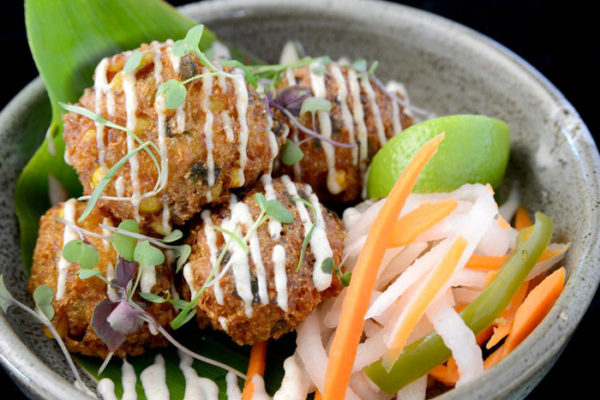
Local Sweet Corn Fritters with Local Lime Cumin Aioli
Serves: 10-12
Ingredients
4 ears local corn (remove kernels from cobs)
3 eggs
5 Tbsp flour
5 Tbsp cornmeal
1 Tbsp salt and pepper mixture
1 Tbsp sugar
1 tsp baking powder
1 tsp baking soda
1 cup jack/cheddar cheese (shredded)
½ cup diced jalapeno
Local Lime Cumin Aioli
2 cups mayo
4 Tbsp local lime juice (squeeze juice from 2-4 local limes depending on size)
4 Tbsp roasted cumin
1 tsp cayenne pepper
1 Tbsp salt and pepper mixture
1 cup sour cream
Local micro basil
Instructions
1. Mix eggs, corn and jalapeno, then add flour, cornmeal, sugar, salt and pepper, and shredded cheese. Mix well. Let rest for 10 minutes.
2. Use a 1-ounce scoop to form a round ball, then deep fry in canola oil at 375 degrees for 3 to 5 minutes.
3. Makes 10 to 12 fritters. Plate fritters and drizzle with aioli sauce. Top with local micro basil.

First Hawaiian Bank donates $40,000 as part of its “Aloha for Hawaii” campaign
Full Story Here: https://www.khon2.com/coronavirus/first-hawaiian-bank-donates-40000-to-child-and-family-service-and-maui-county-farm-bureau-as-part-of-its-aloha-for-hawaii-campaign/
